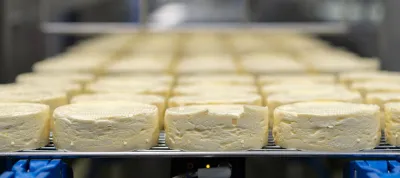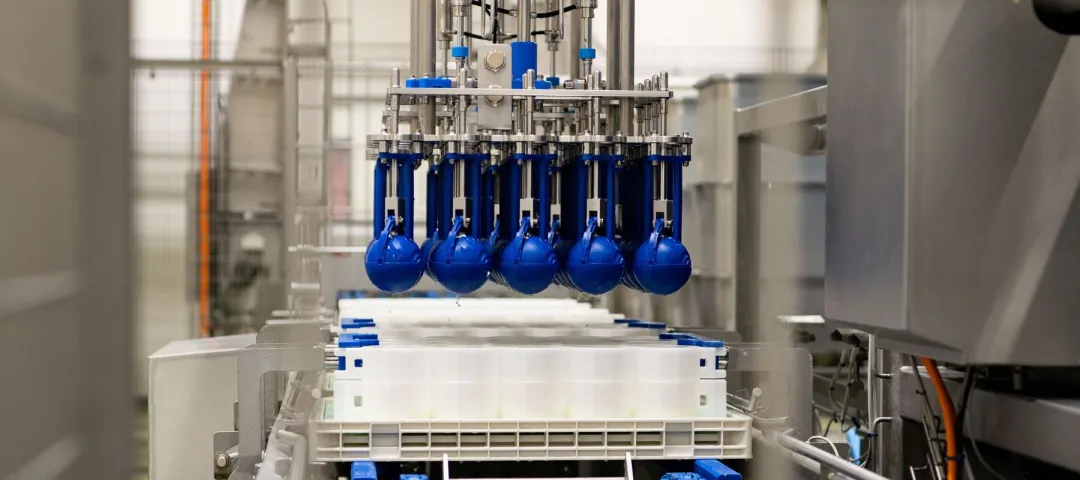General information
RDP Priority
- P3. Food chain and risk management
RDP Focus Area
- 3A: Agri-food chain integration & quality
RDP Measure
- M04: Investments in physical assets
Beneficiary type
- Small-Micro Enterprise
Summary
Founded in 1912 in the heart of the Ornais bocage, the Gillot Cheese Factory is a well-known producer of Camembert de Normandie PDO (Protected Designation of Origin) from France. The raw milk used in their products is sourced from 70 small, family-owned farms that adhere to strict criteria to maintain the distinct qualities of Camembert de Normandie and Pont l’Evêque.
The company encountered challenges such as a shortage of skilled moulders, the physically demanding nature of the work impacting employee well-being and the need to increase production capacity to meet growing demand. With the support of the CAP in 2021, the cheese factory decided to invest in two production lines for its Normandy Camembert: one for moulding and one for cheese turning. These investments have enhanced the competitiveness of cheese production and improved working conditions at the factory.
Results
Project results
- The new production lines have increased daily cheese production by 16 000 units, in addition to the existing 18 000 cheeses produced manually each day.
- The introduction of the new production line has addressed the shortage of skilled workers for moulding.
- Furthermore, the investments have improved the well-being and health of the workers.

Promoter
Gillot Fromagerie SAS
Funding
Total budget 974 000 (EUR)
EAFRD: 613 000 (EUR)
National/Regional: 242 000 (EUR)
Private/own: 119 000 (EUR)
Resources
Documents
Good Practice Report - Investment to improve work conditions and enhance the camembert production in Normandy
(PDF – 3.52 MB)
Links
Context
Established in 1912 in the heart of the Ornais bocage, the Gillot Cheese Factory is a renowned producer of Camembert de Normandie PDO. Over the years, six families have managed the factory, continuing the French tradition of crafting authentic Norman cheeses from raw milk. Today, the Fléchard family carries on this legacy.
The raw milk used in their products comes from 70 small, family-run farms within 40 km of the dairy in the Orne bocage. This close partnership between the cheese dairy and local farmers ensures the superior quality of their cheeses, meeting strict specifications to preserve the unique characteristics of Camembert de Normandie and Pont l'Evêque. Severall'Evêque contributes to the exceptional quality of their cheeses:
- Cows graze on pastures for at least six months annually.
- 80% of thecows'' feed is procow'' on the farm.
- At least 50% of the herd consists of Normandy cows.
- Each cow has ample space to roam, equivalent to half a football pitch.
- Milk production is limited to a specific geographical area.
Gillot Cheese Dairy stands out as the sole independent SME producing Camembert PDO and Pont l’Evêque, upholdil'Evêqueorman cheesemaking tradition.
In 2021, the Gillot Cheese Factory sought CAP support to invest in an automated moulding line to address various challenges. The company faced issues such as a shortage of skilled moulders, the physically demanding nature of the work affecting employees' well-being and the necessity to boost production capacity to meet increasing demand.
Objectives
The objectives of the project were:
- To preserve the know-how of the Normandy Camembert making and moulding process. Through this investment, the factory could maintain the method used by the manual-making process and keep the PDO label.
- To maintain a high level of cheese production to meet a growing demand.
- To reduce the work's arduousness and preserve the employees' well-being.
Activities
To achieve these goals, the project involved two main activities:
- Implementing an automatic moulding line in the factory to support cheese production. This automated line replicates manual moulding practices, maintaining the PDO certification. It operates alongside the existing manual line without affecting employment levels. Each moulding round takes 50 minutes and requires significant manpower, including weekends. The new line reduces weekend staffing needs, making the company more appealing to potential staff.
- Introducing a cheese transportation line to streamline production. This automated system eliminates the need for manual handling, easing the physical strain on employees.
Main results
- The investment in the cheese factory has enhanced its competitiveness. The new production lines have increased daily cheese production by 16 000 units, in addition to the existing 18 000 cheeses produced manually each day.
- The new production line has addressed the shortage of skilled workers for moulding. The factory developed a technological tool that replicates the precise movements of the moulders, enabling them to maintain the PDO label.
- Furthermore, the investments have improved the well-being and health of the workers. Mechanising the time-consuming cheese-turning process, which was previously done manually, has reduced the physical strain on the workers.
Key lessons
- Investing in this type of modernisation project helps to sustain the factory's operations. It is essential to enhance the working conditions of employees to ensure the food industry remains competitive and meets societal demands. This project not only preserved existing jobs but also complemented the work of manual workers.
"These investments contribute to the modernisation of our factory: it contributes to improving the working conditions while preserving the knowledge and methods of production from the Normandy territory."
Emile Flechard

